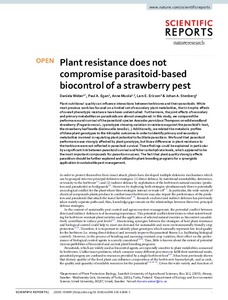Plant resistance does not compromise parasitoid-based biocontrol of a strawberry pest
Daniela Weber; Paul A. Egan; Anne Muola; Lars E. Ericson; Johan A. Stenberg
https://urn.fi/URN:NBN:fi-fe2021042827492
Tiivistelmä
Plant nutritional quality can influence interactions between herbivores
and their parasitoids. While most previous work has focused on a
limited set of secondary plant metabolites, the tri-trophic effects of
overall phenotypic resistance have been understudied. Furthermore, the
joint effects of secondary and primary metabolites on parasitoids are
almost unexplored. In this study, we compared the performance and
survival of the parasitoid species Asecodes parviclava Thompson on wild woodland strawberry (Fragaria vesca L.) genotypes showing variation in resistance against the parasitoid’s host, the strawberry leaf beetle (Galerucella tenella
L.). Additionally, we related the metabolic profiles of these plant
genotypes to the tritrophic outcomes in order to identify primary and
secondary metabolites involved in regulating plant potential to
facilitate parasitism. We found that parasitoid performance was strongly
affected by plant genotype, but those differences in plant resistance
to the herbivore were not reflected in parasitoid survival. These
findings could be explained in particular by a significant link between
parasitoid survival and foliar carbohydrate levels, which appeared to be
the most important compounds for parasitism success. The fact that
plant quality strongly affects parasitism should be further explored and
utilized in plant breeding programs for a synergistic application in
sustainable pest management.
Kokoelmat
- Rinnakkaistallenteet [29335]
